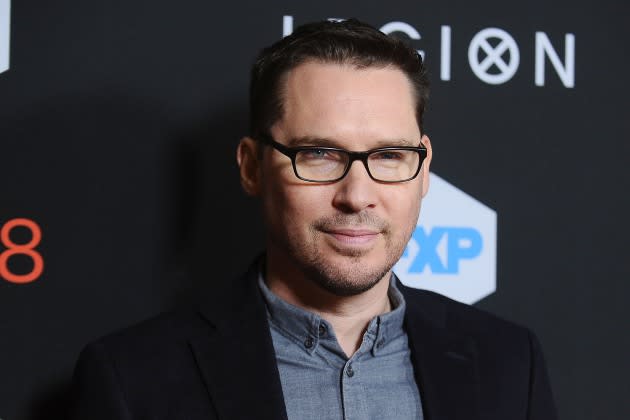Bryan Singer Self-Financing New Documentary to Address Sexual Assault Claims (EXCLUSIVE)
- Oops!Something went wrong.Please try again later.

In October 2017, Bryan Singer appeared energetic and in control as he welcomed Olympic diver Greg Louganis and Queen guitarist Brian May on the London set of “Bohemian Rhapsody.” But behind the scenes, chaos reigned. The onetime Hollywood wunderkind’s career was about to unravel, as Fox executives were growing weary of Singer’s pro- longed absences and erratic behavior. On Dec. 4, Fox pulled the trigger and fired Singer, replacing him with Dexter Fletcher. As Louganis and May smiled for photos with the acclaimed director, it marked one of Singer’s last known days on a film set.
Getting fired from “Bohemian Rhapsody” was a public humiliation for a filmmaker who had racked up hit after hit. But a series of personal scandals would dwarf that professional setback. Over the ensuing five and a half years, Singer tried to reenter the fray with an $80 million remake of ’80s action film “Red Sonja” for Millennium Films. Then a 2019 Atlantic exposé that detailed allegations that Singer sexually assaulted four men when they were underage derailed those plans. (Singer categorically denied ever having sex with, or a preference for, underage men.) Millennium CEO Avi Lerner initially stood by Singer, dubbing the report “agenda-driven fake news,” but dropped him when he couldn’t find a domestic distributor. Though the once in-demand helmer made studios billions thanks to four “X-Men” movies and “Superman Returns,” he had become persona non grata in the post-#MeToo landscape.
More from Variety
Now, Singer is quietly plotting a comeback and has been pitching industryites on a slate of films. Sources say the director, who catapulted to A-list status with his twisty 1995 crime film “The Usual Suspects,” is looking to return to his lower-budget auteur roots with three narrative features set in and around Israel, where he has been living in recent years. Singer, who is working without an agent, has been meeting with would-be investors about backing the films, one of which is set in the 1970s. They would be made for $10 million apiece. Jason Taylor, who previously served as president of production at Singer’s Bad Hat Harry Prods., is producing the films.
A representative for Singer declined to comment.
Even more intriguing, Singer is working on a self-financed documentary about himself and “his struggles,” says one source who was approached about the project, and calls the pitch “impressive.” According to his pitch, Singer plans to address the allegations of sexual misdeeds and cover his attempt at career resurrection, the source adds. “Well, at least we know it will be fair and balanced,” one documentary veteran quips.
Controversies aside, Singer’s backstory is dramatic. He was adopted by Grace Sinden, an environmental activist, and Norbert Dave Singer, a corporate executive, and was raised Jewish in suburban New Jersey, where he began dabbling as a teen in filmmaking. After he graduated from USC, his rise was meteoric; his debut feature film, “Public Access,” took the Grand Jury Prize at Sundance in 1993. His follow-up, “The Usual Suspects,” solidified his status as a young visionary after star Kevin Spacey and writer Christopher McQuarrie nabbed Oscars.
Still, there was a dark side to Singer’s improbable journey, including well-reported substance abuse issues and a mercurial temperament. But most damaging have been the sexual misconduct allegations that began in 1997 on the set of “Apt Pupil.” Two teenage boys — one 14 and the other 17 — filed a civil lawsuit claiming that they were ordered to strip naked for a scene, while two other young actors made similar allegations in separate civil suits. Singer was named as a defendant in the suits, which were settled for an undisclosed sum. (He has never faced criminal charges.)
If Singer is able to relaunch his career, he will be one of the few artists accused of sexual harassment or assault to have staged a comeback. Morgan Freeman survived a 2018 CNN investigative piece in which eight women accused him of harassment and inappropriate behavior, going on to star in Lerner’s “Hitman’s Wife’s Bodyguard” three years later and even presenting at the Oscars in March. Dustin Hoffman, who retreated from studio fare after claims by seven women of harassment or assault, is reprising his role as the voice of Master Shifu in next year’s “Kung Fu Panda 4.” But for most accused celebrities, a mainstream return has proved elusive.
Documentaries are seen as a path back for filmmakers who can’t land studio work in the post-#MeToo climate. Sources say Brett Ratner, who was also accused of sexual abuse and harassment, has expressed interest in making a documentary about Anthony Hopkins, who starred in his 2002 film “Red Dragon,” but that project appears to have stalled. Given their smaller budgets, which rarely exceed $1 million, documentaries can be self-financed and often rely on distributors other than the publicly traded media giants, which are increasingly averse to taking a chance on scandal-ridden talent. Singer presumably has plenty of money, having received a $40 million-plus payday on “Bohemian Rhapsody,” which includes both his upfront fee and profit participation.
Taylor has documentary experience that will come in handy, having worked on “Look, Up in the Sky! The Amazing Story of Superman” and “The Valkyrie Legacy.”
Ultimately, that October 2017 day on the “Bohemian Rhapsody” set may prove fruitful. Another source says Singer also is working on a documentary about Louganis, a gold medalist at the 1984 and 1988 Summer Games and an LGBT activist who triumphed over adversity. Louganis’ life could be the stuff of a compelling documentary. But will Singer’s reputation keep the project from reaching the finish line?
Best of Variety
Sign up for Variety’s Newsletter. For the latest news, follow us on Facebook, Twitter, and Instagram.
